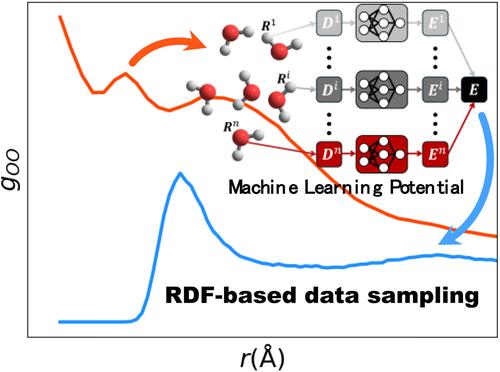当前位置:
X-MOL 学术
›
J. Comput. Chem.
›
论文详情
Our official English website, www.x-mol.net, welcomes your
feedback! (Note: you will need to create a separate account there.)
A machine learning potential construction based on radial distribution function sampling
Journal of Computational Chemistry ( IF 3.4 ) Pub Date : 2024-09-03 , DOI: 10.1002/jcc.27497 Natsuki Watanabe 1, 2 , Yuta Hori 1 , Hiroki Sugisawa 3 , Tomonori Ida 4 , Mitsuo Shoji 1 , Yasuteru Shigeta 1
Journal of Computational Chemistry ( IF 3.4 ) Pub Date : 2024-09-03 , DOI: 10.1002/jcc.27497 Natsuki Watanabe 1, 2 , Yuta Hori 1 , Hiroki Sugisawa 3 , Tomonori Ida 4 , Mitsuo Shoji 1 , Yasuteru Shigeta 1
Affiliation

|
Sampling reference data is crucial in machine learning potential (MLP) construction. Inadequate coverage of local configurations in reference data may lead to unphysical behaviors in MLP-based molecular dynamics (MLP-MD) simulations. To address this problem, this study proposes a new on-the-fly reference data sampling method called radial distribution function (RDF)-based data sampling for MLP construction. This method detects and extracts anomalous structures from the trajectories of MLP-MD simulations by focusing on the shapes of RDFs. The detected structures are added to the reference data to improve the accuracy of the MLP. This method allows us to realize a reasonable MLP construction for liquid water with minimal additional data. We prepare data from an H2O molecular cluster system and verify whether the constructed MLPs are practical for bulk water systems. MLP-MD simulations without RDF-based data sampling show unphysical behaviors, such as atomic collisions. In contrast, after applying this method, we obtain MLP-MD trajectories with features, such as RDF shapes and angle distributions, that are comparable to those of ab initio MD simulations. Our simulation results demonstrate that the RDF-based data sampling approach is useful for constructing MLPs that are robust to extrapolations from molecular cluster systems to bulk systems without any specialized know-how.
中文翻译:

一种基于径向分布函数采样的机器学习潜力构造
对参考数据进行采样在机器学习潜力 (MLP) 构建中至关重要。参考数据中对局部配置的覆盖不足可能会导致基于 MLP 的分子动力学 (MLP-MD) 模拟中出现非物理行为。为了解决这个问题,本研究提出了一种新的动态参考数据采样方法,称为基于径向分布函数 (RDF) 的数据采样,用于 MLP 构建。该方法通过关注 RDF 的形状,从 MLP-MD 模拟的轨迹中检测和提取异常结构。将检测到的结构添加到参考数据中,以提高 MLP 的准确性。这种方法使我们能够以最少的额外数据实现液态水的合理 MLP 构建。我们从 H2O 分子簇系统准备数据,并验证构建的 MLP 是否适用于散装水系统。没有基于 RDF 的数据采样的 MLP-MD 模拟显示了非物理行为,例如原子碰撞。相比之下,在应用这种方法后,我们获得了具有 RDF 形状和角度分布等特征的 MLP-MD 轨迹,这些特征与 ab initio MD 模拟相当。我们的仿真结果表明,基于 RDF 的数据采样方法可用于构建 MLP,这些 MLP 无需任何专业知识即可从分子簇系统推断到体系统。
更新日期:2024-09-03
中文翻译:

一种基于径向分布函数采样的机器学习潜力构造
对参考数据进行采样在机器学习潜力 (MLP) 构建中至关重要。参考数据中对局部配置的覆盖不足可能会导致基于 MLP 的分子动力学 (MLP-MD) 模拟中出现非物理行为。为了解决这个问题,本研究提出了一种新的动态参考数据采样方法,称为基于径向分布函数 (RDF) 的数据采样,用于 MLP 构建。该方法通过关注 RDF 的形状,从 MLP-MD 模拟的轨迹中检测和提取异常结构。将检测到的结构添加到参考数据中,以提高 MLP 的准确性。这种方法使我们能够以最少的额外数据实现液态水的合理 MLP 构建。我们从 H2O 分子簇系统准备数据,并验证构建的 MLP 是否适用于散装水系统。没有基于 RDF 的数据采样的 MLP-MD 模拟显示了非物理行为,例如原子碰撞。相比之下,在应用这种方法后,我们获得了具有 RDF 形状和角度分布等特征的 MLP-MD 轨迹,这些特征与 ab initio MD 模拟相当。我们的仿真结果表明,基于 RDF 的数据采样方法可用于构建 MLP,这些 MLP 无需任何专业知识即可从分子簇系统推断到体系统。































 京公网安备 11010802027423号
京公网安备 11010802027423号